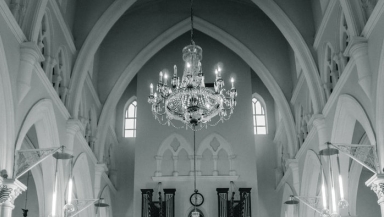
Christian Parliamentarians and leaders have re-committed to tackling the "huge" problem of persecution around the world.
Fiona Bruce MP, the Prime Minister's Special Envoy on Freedom of Religion or Belief (FoRB), told a fringe event at the Conservative Party Conference that an estimated 83% of people around the world are living in countries where there is some kind of restriction on beliefs.
"And the extent of this in the 21st century is not only largely unrecognised but simply staggering," she said.
The Conservative MP for Congleton said that while it was "wonderful" to see a growing awareness of the problem among Parliamentarians, there was still more to be done.
She spoke of a need to improve religious literacy levels among Foreign Office workers, and for the UK to be "bolder and braver" in both holding governments across the world to account and calling out specific cases of abuse.
"It is insufficient to talk in general terms, to say for example, repetitively, that FoRB is a key human rights priority," she said.
"It's insufficient to have perhaps a quiet diplomatic word when there's an issue, without necessarily highlighting it publicly."
She gave as an example Pakistani Christian woman Asia Bibi, who was acquitted of blasphemy and freed from death row in Pakistan after years of advocacy.
"It took campaigning. These campaigns can make a difference; engage with them. But governments need to do more as well - we underestimate the soft power of the UK even today," she said.
Fiona is involved in preparations for an FoRB ministerial to be hosted by the UK in July 2022 that will focus on best practice and support for victims.
Turning her attention to the role of UK churches, she encouraged them to invite speakers involved in anti-persecution work as a way of helping to raise awareness.
"There is still a limited appreciation amongst churches across this country of how massive this issue is worldwide," she said.
Christians can also ask their MP to join the APPG FoRB, she suggested: "Encourage your MP and then very courteously hold them to account to actually act."
Fiona was one of several speakers at the FoRB event organised by the Conservative Christian Fellowship and SAT-7.
The meeting heard about the plight of persecuted Christians like Pakistani teenager Maria Shahbaz, who is in hiding with her family after escaping from a Muslim man who forced her to convert to Islam and marry him; and Leah Sharibu, another Christian teenager who was abducted from her school in Nigeria by Boko Haram and enslaved for refusing to renounce her faith.
Concerns were also raised about the estimated 2,700 Yazidi women kidnapped by ISIS who remain missing, and Uighur Muslims imprisoned in "modern day concentration camps" in China.
Christian Solidarity Worldwide founder Mervyn Thomas said Christians had a duty to speak up for all people suffering for their faith.
"The problem is huge but of course it's not confined to Christians," he said.
"It is so important that Christians speak up for all faiths and none around the world.
"Apart from anything else, it is what Jesus would do ... and it's also missional when we do this. We do this because we are Christian. We speak up for other faiths because that's what Christ told us to do.
"It doesn't dilute our Christian faith, it doesn't make us some kind of syncretist. It makes us a true Christian actually because we are all made in the image of God and God gave us the right to choose - God gave us a free will."
Coptic Archbishop of London, Archbishop Angaelos, said it was important to support the thriving of persecuted communities, not just their survival.
"When we look to the needs of others, our benchmark must be what we expect for ourselves. We cannot expect others to just 'survive' with a basic level of existence," he said.
"This is not about mere provision or charity; it is about prosperity. It is not about protecting those we perceive to be weaker; it is about their safety. It is not just about their survival, as survival is not a privilege; it is a right.
"It is about their human dignity and their God-given image and likeness that they, and we, all share in common, and which we must stand to protect and defend."
Life peer Lord Farmer expressed his concern about the UK, where he said "Christians can increasingly expect a soft persecution".
He cited the controversy surrounding Worcester College, part of the University of Oxford, after it apologised for hosting a Christian training event.
"Christians in the UK have been privileged historically to live in a tolerant society where a whole range of views are acceptable but now we are operating in an increasingly illiberal public square," he said.
"There is a form of secularism just as zealous as the Christian faith which will squash religion whenever it sees it, and wherever it sees it, while masquerading as liberty and neutrality."
He added, "Christians must fight for the rights of both their own faith and the faith of others, else a far less tolerant society quickly takes its place."













